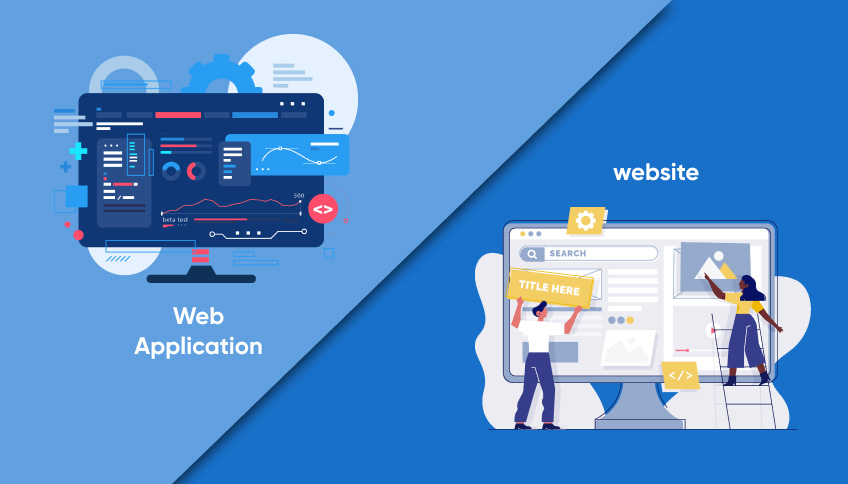Looking for a reliable guide to decide between Web App vs Website? Keep on reading to know everything.
Web App vs Website: What to Choose When Deciding on Services?
In today’s digital-first world, both websites and web applications serve different purposes. Web app development focuses on delivering information through static or dynamic content, making them great for brand awareness and SEO. Web app development, on the other hand, offer interactive, dynamic experiences. Apps are developed so that users can perform tasks and engage with features. Web apps are more complex to develop and maintain but are ideal for businesses seeking high user engagement. Therefore, to decide between web app Vs website needs a critical understanding of both the options in addition to having a clear picture about the end goal.
Choosing between a website and a web app can be confusing due to the overlapping functionality of modern platforms. Traditionally, websites were static pages offering information. Web apps, on the other hand, were designed to perform specific tasks. However, as the web evolved, websites began incorporating interactive features. This to some extent has blurred the line between the two.
Businesses often refer to their entire digital presence as a website. Thus, to choose the right solution, gets even more difficult. So, to make everything clear and offer you a better understanding, here is a detailed guide having all the essential information.
Let’s get started!
What is a Website?
A website is a collection of digital content linked to a specific domain name. It is accessible through the internet. A website can be as simple as a single-page site and can also be a 1,000 pages platform depending upon the specific business needs. This specific requirement very much depends upon the business goal to be achieved and needs to be fulfilled with this.
A website is generally organized into multiple sections or pages. The home page serves as the very important and the main page of the entire website. Home page is all about providing an overview of the website’s content to the users. It includes links to other sections or pages. This helps visitors to navigate through the site. It’s typically the first point of contact for users and provides the initial idea of what the site has to offer.
What is a web page?
A web app, in simplest terms is a software program hosted on a server. The program is accessed through a web browser. Web apps are generally built using scripting languages like PHP, Perl, or Java, and databases like MySQL or PostgreSQL. With web apps users have a global accessibility of various platforms.
These platforms allow users to manage data from any device with internet access. They can either manage the data through smartphones or tablets. One of their key advantages is the ability to update or modify features without redeploying the entire application. This makes web apps more flexible and efficient compared to traditional desktop applications. This agility drives their growing popularity.
Now that we’ve outlined the basics of a website and a web application, it is now time to explore the key differences between the two. We will discuss and talk about both platform’s functionality, interactivity, and user engagement. This will make it easier for you to decide which option best fits your business goals.
Web App vs Website: What are the key differences?
We will talk about the difference between both the platforms on various key factors. Starting with:
Purpose
When it comes to developing web apps Vs websites, the objectives differ along with the outcomes of the process. Web apps offer a highly customizable experience and serve a variety of purposes. This goes true for e-commerce websites to social networking sites. The benefit allows users to interact and accomplish tasks.
In contrast, websites primarily function as digital showcases, providing information and raising awareness about a business, product, or service. Consumers increasingly rely on the internet to connect with businesses. To serve such a purpose, the right platform in place is crucial to achieving your specific business goals. Evaluate carefully to determine which fits your needs.
Accessibility
When it comes to accessibility, web apps and websites share several key similarities. However, there are some distinct differences also. The similarity includes, both require an internet connection and a web browser for access. This eliminates the need for downloads or installations. This shared foundation makes them easily accessible across various devices and platforms.
However, the main difference between web apps and websites lies in their approach to authentication. Web apps typically necessitate user authentication. This is for ensuring robust security and personalized experiences. This requirement protects sensitive data and functionality by restricting access to authorized users only.
On the other hand, many informational websites operate with optional authentication. In fact, studies indicate that up to 98% of traffic to an average website comes from unregistered visitors. This open access allows users to browse content freely without the need to log in. Thus, it caters to a broader audience while sacrificing some level of personalized security.
Cost
The costs associated with developing websites and web applications can vary significantly. This is because there are various factors that play a role in influencing the decision. It includes factors such as project size and feature complexity. Generally, web applications, with their dynamic and sophisticated functionalities, tend to be more expensive than static websites.
Web apps often involve more complex development processes and integrations. This contributes to a higher price tag. In addition to this, the development timeline for web applications is typically longer. A fully developed web app, particularly one with advanced features and a sophisticated user interface, can take over 9 months to complete. This extended timeline reflects the intricate work involved in building and refining such applications. It thus adds more to the cost.
Components
The level of interactivity a website offers is a key factor in determining the differences between web applications and websites. We know that websites typically present a static collection of pages. This includes a homepage and other additional section of pages. Each of these pages serves specific purposes. These pages can showcase varied visual designs and textual content based on your needs. However, the interaction of such pages is generally limited to basic navigational functions.
In contrast to this, web applications are designed with interactivity at their core. They allow users to engage with dynamic elements and perform specific tasks. These tasks include submitting forms, managing data, or utilizing complex tools. This interactive nature necessitates more intricate interfaces, structures, and data storage solutions than those found in traditional websites.
While certain features, like online stores, can be incorporated into websites, they are often more limited in scope and interactivity compared to the functionalities of web applications. Web apps offer a more immersive and interactive user experience, driven by their capability to handle complex operations and provide personalized interactions.
Development
Both website and web application development demand programming expertise. Although having similar demands, the process for both options significantly differs. Website development primarily focuses on delivering a substantial volume of static content across various web pages. This involves designing and structuring pages to present information. This includes less emphasis on interactive functionality. Developers in this field need proficiency in web design, development software, and publishing tools. They must also needs to have skilful experience in foundational programming languages.
On the other hand, web application development is inherently more complex. This is because due to its focus on interactive elements and task handling. This process requires creating dynamic pages that support user interactions and complex functionalities. Developers in this arena need a deeper skill set. They need to have knowledge of web standards, advanced scripting, and programming languages.
What should be considered when choosing a platform for the business?
There are various concerns that play a critical role in helping to decide the choice of web app Vs website. Here are a few of such concerns.
Cost-Effective: Websites generally cost less to develop and maintain compared to web applications. Their simpler design and limited functionality mean they don’t require the extensive back-end infrastructure that web apps do.
User-Friendly: Websites are straightforward for users to navigate, adhering to familiar layouts and structures like menus and links, which enhances usability.
Broad Accessibility: With just an internet connection, anyone can access websites, making them an ideal choice for businesses aiming to reach a wide audience.
Rapid Development: Due to their simpler design and functionality, websites can often be developed quickly, sometimes within a few weeks.
Adaptable: Websites can be easily updated and modified without needing a complete redeployment, allowing for flexibility to adapt to changing needs and requirements.
How IDS Logic can help?
IDS logic can offer you website development services in addition to helping with app development concerns. We have a full-fledged team of experienced professionals who are skilled to offer web app vs website development services using any of the technologies. In order to make development easier we have a streamlined process that is structured to provide services as required to business.
Our project handling and development processes ensure that clients get every bit of information as the project goes from one stage to another. In case, you are also looking for a reliable partner for website development services, do reach out to us for a quick meeting.












